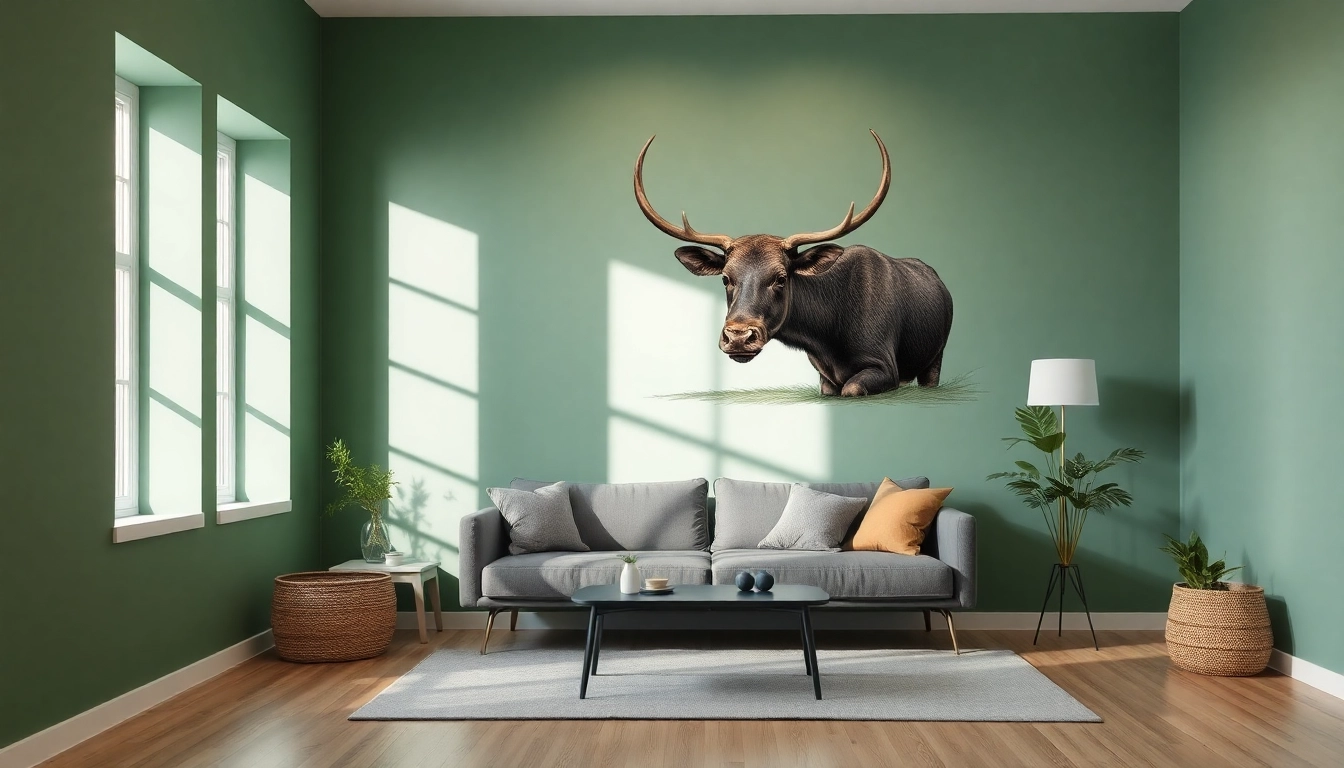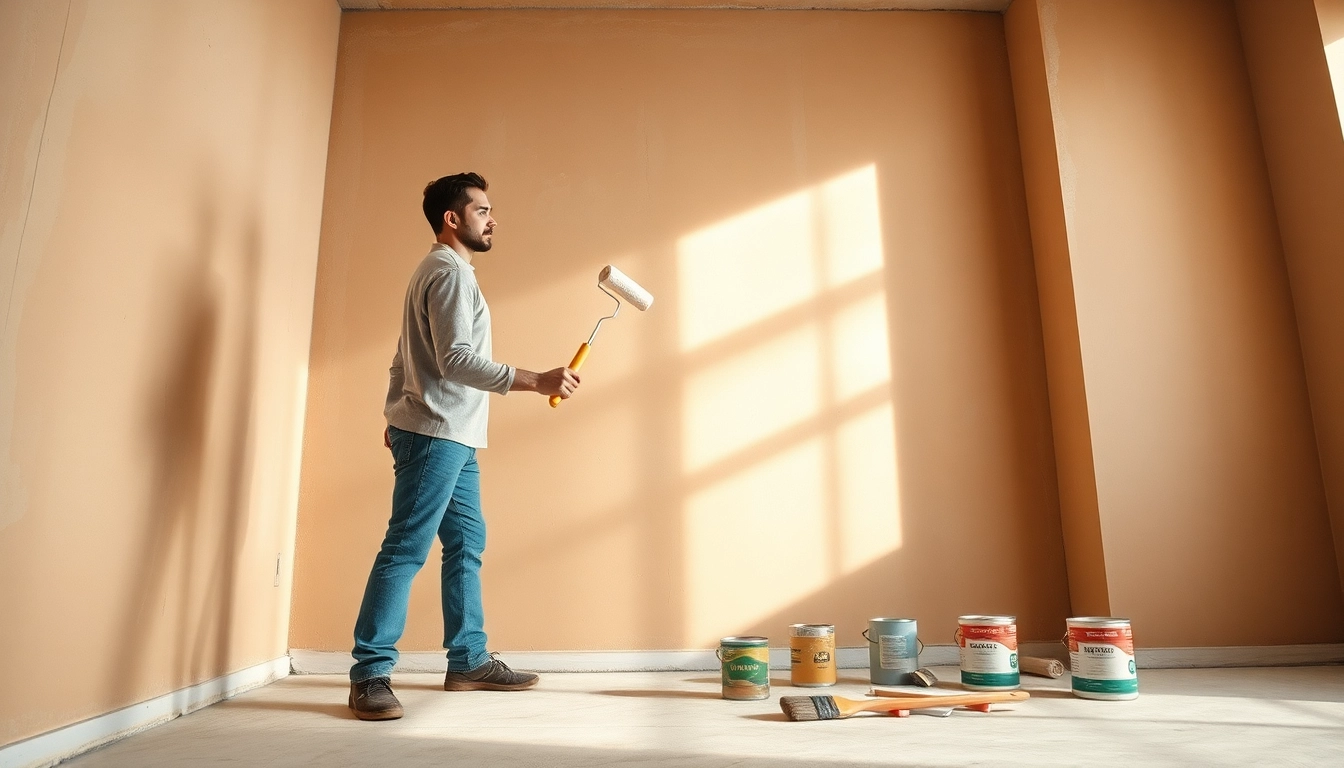
Understanding Mooswand für Zuhause
What is Mooswand?
Mooswand, or moss walls, are innovative decorative features that utilize preserved moss to create stunning visual displays in various environments. Unlike traditional wall art, mooswand offers a unique blend of natural beauty and the benefits of biophilic design. These installations are typically created from various types of preserved moss and greenery that are carefully selected for their color, texture, and maintenance requirements. The primary appeal of a mooswand lies in its ability to bring the calming essence of nature indoors, enhancing aesthetic allure while also improving air quality and contributing to the overall well-being of the space.
Benefits of Mooswand für Zuhause
The installation of a Mooswand für Zuhause comes with a plethora of benefits that extend beyond mere decoration. Firstly, natural moss has sound-absorbing properties, which can significantly reduce noise levels in urban environments, making the home more peaceful. Secondly, these installations require little to no maintenance, as the preserved moss does not need watering or sunlight, making them an ideal choice for individuals who desire greenery without the commitment of plant care. Additionally, mooswand can enhance air quality by naturally absorbing toxins and releasing oxygen, fostering a healthier living environment. Moreover, these walls are hypoallergenic and make a sustainable choice for eco-conscious homeowners, as they utilize preserved plants that do not deplete natural resources.
Types of Mooswand Materials
Mooswand typically consists of various materials that contribute to its overall appearance and functionality. The most common types include:
- Reindeer Moss: Renowned for its soft texture and vibrant colors, reindeer moss adds a fluffy, cushion-like quality to the wall.
- Forest Moss: This type is grittier and has dark, lush appearances, ideal for creating depth and contrast in design.
- Sheet Moss: Used for larger surface areas, sheet moss provides a uniform look, excellent for minimalist aesthetics.
- Lichens: Often used in combination with other moss species, lichens introduce diversity in texture, adding visual interest and complexity to the installation.
- Air Plants (Tillandsia): Sometimes integrated within mooswand designs, air plants require minimal care and add a three-dimensional aspect to the wall.
Designing Your Space with Mooswand
Choosing the Right Location
When designing with mooswand, the location of installation is crucial. An ideal spot would be a focal wall in areas where natural light is minimal, such as living rooms, office spaces, or even bathrooms. Here, mooswand can serve as a stunning backdrop, drawing attention while also contributing to a serene atmosphere. It is advisable to avoid direct sunlight and high humidity areas, which could potentially damage the moss over time. Additionally, consider the height and scale of the wall to ensure the installation is proportionate to the surrounding furniture and architecture.
Complementary Decor Ideas
Complementing your mooswand with the right decor can elevate the ambiance of your space. Combining natural elements such as wooden furniture, stone accessories, or terracotta pots can create a harmonious aesthetic. Additionally, integrating LED lighting around the mooswand can accentuate its color and texture, creating a captivating visual effect, especially in the evening. Some homeowners opt to include framed artwork or mirrors adjacent to the mooswand for added depth, while others might place greenery like potted plants strategically at the base to enhance the natural feel.
Color Palettes for Mooswand Integration
The color palette chosen to accompany a mooswand is integral to achieving a cohesive look. Neutral tones, such as whites, creams, and soft grays, provide a calming background that lets the vibrant greens of the moss stand out. For a bolder approach, deep jewel tones like emerald green, navy blue, or rich burgundy can create a striking contrast, emphasizing the moss’s beauty. Accents in metallics could also be used to bring a touch of sophistication to the overall design. Ultimately, the color choices should reflect your personal style and blend seamlessly with the existing decor.
Installation of Mooswand für Zuhause
DIY Installation Steps
Installing a mooswand can be a fulfilling DIY project if approached methodically. Here’s a simple step-by-step guide on how to do it:
- Gather Supplies: You will need preserved moss, a backing material (like plywood or MDF), strong adhesive, a utility knife, and screws for wall mounting.
- Prepare the Wall: Ensure the wall is clean, dry, and free from dust or grease. If using a backing, ensure it is cut to the appropriate size.
- Apply Adhesive: Using a strong spray adhesive or glue, apply a fair amount to the backing or wall surface where the moss will be attached.
- Arrange Moss: Start placing the moss on the adhesive, arranging it to create a visually appealing pattern. Play with textures and colors.
- Secure Edges: Once moss is placed and the design is finalized, secure the edges with additional adhesive and ensure all areas are properly attached.
- Mounting (if applicable): If the installation is on a backing, mount it securely to the wall using screws.
- Finishing Touches: Allow the adhesive to cure as per the manufacturer’s instructions before touching or adjusting the moss.
Professional Installation Considerations
For those who prefer to hire professionals, several factors should be considered. Firstly, evaluate the professionals’ experience and portfolio; examine past mooswand installations to ensure they resonate with your design aesthetic. Additionally, verify that they use high-quality materials, as this affects the longevity and appearance of your mooswand. Pricing can vary significantly based on complexity and size, so obtaining multiple quotes is prudent. Lastly, discuss maintenance guidelines with the installer to understand care expectations after installation.
Common Installation Mistakes to Avoid
While installing a mooswand can be straightforward, certain pitfalls should be avoided to ensure a successful setup:
- Neglecting Wall Preparation: Failing to clean the wall can lead to poor adhesion, resulting in the moss peeling off over time.
- Miscalculating Size: Not accurately measuring the wall space or the moss can lead to wasted materials or an incomplete look.
- Lack of Plan for Maintenance: Not discussing maintenance considerations could cause chaos later; it’s crucial to know how to care for your installation.
- Improper Adhesive Use: Using the wrong type of adhesive can jeopardize the longevity of the moss; always choose products specifically designed for indoor installations.
- Ignoring Environment Factors: Installing in areas with significant moisture or direct sunlight can cause the moss to degrade more quickly.
Caring for Your Mooswand
Maintenance Best Practices
Caring for a mooswand is relatively simple, as preserved moss requires minimal upkeep. Regular maintenance involves cleaning and checking the moss for any deterioration:
- Dusting: Use a soft-bristled brush or a handheld vacuum on a low setting to remove dust from the moss surface without damaging it.
- Humidity Control: Maintain a humidity level between 40-60%. While preserved moss is tolerant, extremely low humidity can cause it to dry out.
- Regular Checks: Regularly inspect the moss for signs of fading or deterioration. If you notice significant changes, professional restoration may be needed.
Cleaning Techniques for Longevity
When cleaning a mooswand, use care to avoid damaging the moss:
- Avoid Water: Since preserved moss should not be exposed to water, avoid washing the wall directly with a wet cloth.
- Gentle Products: If necessary, a diluted solution of isopropyl alcohol in water can be misted lightly onto the moss when required and wiped gently with a soft cloth.
- Dry Conditions: Ensure that the wall is kept in a dry environment to prevent any moisture buildup that can lead to mold or decay.
Signs Your Mooswand Needs Attention
Over time, there may be signs that your mooswand requires attention. Common indicators include:
- Significant Color Fading: If the vibrant greens start to turn dull, it may be time to rejuvenate the moss.
- Visible Damage: Areas where the moss has begun to peel away or has deteriorated indicate a need for repair.
- Odor: Any unpleasant smells emanating from the view may suggest mold or decay, necessitating immediate action.
Innovative Uses of Mooswand für Zuhause
Incorporating Mooswand in Home Offices
With the rise of remote working, incorporating mooswand into home offices can significantly improve workspace aesthetics and atmosphere. The natural greenery can create a calming backdrop that may enhance focus, creativity, and overall well-being. Moreover, mooswand can be used as a partition in open-plan offices, helping demarcate areas without completely enacting separation, maintaining an airy and open feel while still providing a touch of nature.
Creating Relaxation Zones with Mooswand
Incorporating a mooswand into relaxation spaces, such as reading nooks or meditation areas, can amplify their serenity. The natural texture and color of the moss evoke a sense of tranquility, making these zones more inviting. Consider surrounding the mooswand with comfortable seating, soft lighting, and other natural elements such as stone or wood to create a cohesive and restorative environment.
Mooswand in Commercial Spaces
Beyond home use, mooswand has gained popularity in commercial spaces such as restaurants, hotels, and offices. For businesses, mooswand serves as an eye-catching feature that differentiates them from competitors, enhancing the customer experience. In an office setting, it contributes to employee well-being, thereby improving productivity. Additionally, a well-designed mooswand can even serve as a strong branding element, reinforcing a company’s commitment to sustainability and innovative design.







